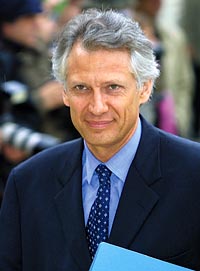Charges filed against former French PM Villepin for his attempts to discredit Nicolas Sarkozy
Preliminary charges have been filed Friday against former French Prime Minister Dominique de Villepin for his suspected role in a smear campaign that targeted Nicolas Sarkozy before he was France's president, his lawyer said.

The case stems from an alleged attempt in 2003-2004 to discredit Sarkozy, who was a government minister at the time and a political rival of Villepin within their conservative UMP party.
Villepin said he committed no wrongdoing.
"At no moment did I take part in any political maneuvering," Villepin said Friday after appearing before investigating judges. The preliminary charges against him include "complicity in slanderous denunciations" and "complicity in using forgeries," lawyer Luc Brossollet said.
The bizarre, complex case has shaken France's political world and tainted the reputation of Villepin, a longtime diplomat who was once a star of France's conservatives.
The scandal started simmering when a judge received a mysterious CD-ROM accusing Sarkozy and other top ministers of holding secret accounts with Luxembourg bank Clearstream. The bank accounts were purportedly created to hold bribes from a 1991 sale of frigates to Taiwan.
But investigators realized the scheme was an elaborate hoax and turned their attention to uncovering the culprits.
Investigating judges Henri Pons and Jean-Marie d'Huy suspect Villepin of a role in the scheme to discredit rivals - including Sarkozy, who already had his sights on France's highest office at that point. Villepin was also believed to have presidential ambitions then, before his popularity plunged during strikes and protests over a labor law he pushed for last year.
Villepin's legal team said he had not answered any in-depth questions by the magistrates Friday.
"He has never had access to the dossier before - today, there are 26 tomes (of documents) - and it's a dossier that deserves to be analyzed with a fresh eye," lawyer Olivier d'Antin said. "He informed the judge that he was ready to respond to questions once he had knowledge of the dossier."
Villepin has portrayed himself as a victim in the case.
"I was the victim ... of slander and lies," Villepin said in December, after an initial hearing that lasted 17 hours.
Villepin left his job as premier in May when Sarkozy replaced former President Jacques Chirac. Soon afterward, investigators searched Villepin's home and office after the discovery of his name in computer files belonging to a Defense Ministry official, Gen. Philippe Rondot.
Rondot wrote in his notes that two key players in the scandal told him they acted on orders from Villepin.
Rondot, a former spy, was involved because Villepin had asked him to investigate the list of secret bank accounts. The question is whether Villepin knew the list was a fake, and even whether he was behind its creation. Villepin said Friday that he took the list seriously and that he ordered the investigation "to confront threats concerning our economic interests."
"Naturally, I will respond to all questions that will be asked of me," Villepin said.
Under French law, a minister or former minister has the right to argue that he should be judged by the special Court of Justice, which tries officials accused of wrongdoing in their functions.
Among issues to be determined is whether Villepin would have acted in his capacity as a minister - as he contends. Villepin's lawyers said he wanted to study the dossier before making a decision on whether to contest the current proceedings and go before the other court.
Villepin served as foreign and interior minister under Chirac before being named premier. His international moment of glory came in a 2003 speech before the U.N. Security Council, where he made an eloquent case against the U.S. war in Iraq.
Other prominent figures have been questioned in the case, including former Prime Minister Jean-Pierre Raffarin and Interior Minister Michele Alliot-Marie, defense minister at the time. Chirac has refused to be questioned in the affair, citing judicial immunity granted for acts during his presidential tenure.
Under French law, preliminary charges mean that the investigating judge has determined there is strong evidence to suggest involvement in a crime. The filing gives the magistrate time to pursue a deeper probe that can result in a trial or the dropping of charges of no crime is found.
Villepin is not the first former French premier to face legal woes. In 2004, Alain Juppe was convicted in a corruption case that predated his time as premier and given a 14-month suspended prison sentence and a yearlong ban from politics. In 1999, Laurent Fabius was acquitted of manslaughter in the case of people given blood transfusions tainted with the HIV virus.
Subscribe to Pravda.Ru Telegram channel, Facebook, RSS!

